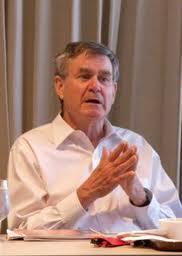
IAN HACKING
Ian MacDougall Hacking (born February 18, 1936) is a Canadian philosopher, specializing in the philosophy of science.Born in Vancouver, British Columbia, Canada, he has undergraduate degrees from the University of British Columbia (1956) and the University of Cambridge (1958), where he was a student at Trinity College, Cambridge. Hacking also took his Ph.D. at Cambridge (1962), under the direction of Casimir Lewy, a former student of Ludwig Wittgenstein's.He taught at UBC in Canada as an Assistant Professor, then an Associate Professor, spending some time teaching at the Makerere University in Uganda. He became a lecturer at Cambridge in 1969 before shifting to Stanford in 1974. After teaching for several years at Stanford University, he spent a year at the Center for Interdisciplinary Research in Bielefeld, Germany, (1982–1983). He became Professor of Philosophy at the University of Toronto in 1983 and University Professor (the highest honour the University of Toronto bestows on faculty) in 1991. From 2000 to 2006, he held the Chair of Philosophy and History of Scientific Concepts at the Collège de France, the first Anglophone to be elected to a permanent chair in the Collège's history.[1] After retiring from the Collège de France, Hacking was a Professor of Philosophy at UC Santa Cruz.Works: Influenced by debates involving Thomas Kuhn, Imre Lakatos, Paul Feyerabend and others, Hacking is known for bringing a historical approach to the philosophy of science. The fourth edition (2010) of Feyerabend's 1975 book Against Method and the fiftieth anniversary edition (2012) of Kuhn's The Structure of Scientific Revolutions include an Introduction by Hacking. Hacking is sometimes described as a member of the "Stanford School" in philosophy of science, a group that also included John Dupré, Nancy Cartwright and Peter Galison. He himself still identifies as a Cambridge analytic philosopher. Hacking defended a realism about science, "entity realism", albeit only on pragmatic and particularly experimental grounds: the electron is real because human beings use it to make things happen. This form of realism encourages a realistic stance towards the entities postulated by mature sciences but skepticism towards scientific theories. Hacking has also been influential in directing attention to the experimental and even engineering practices of science, and their relative autonomy from theory. In that way Hacking moved philosophical thinking a step further than the initial historical, but heavily theory-focused, turn of Kuhn et al.In his later work (from 1990 onward), his focus has shifted somewhat from the natural sciences to the human sciences, partly under the influence of the work of Michel Foucault. Foucault was an influence as early as Why Does Language Matter to Philosophy? and The Emergence of Probability (both 1975). In the latter book, Hacking proposed that the modern schism between subjective or personalist probability, and the long-run frequency interpretation, emerged in the early modern era as an epistemological "break" involving two incompatible models of uncertainty and chance. As history the idea of a sharp break has been criticized, but competing 'frequentist' and 'subjective' interpretations of probability still remain today. Foucault's approach to knowledge systems and power is also reflected in Hacking's work on the historical mutability of psychiatric disorders and institutional roles for statistical reasoning in the 19th century. He labels his approach to the human sciences "dynamic nominalism" (or, alternately, "dialectical realism"), a historicised form of nominalism that traces the mutual interactions over time between the phenomena of the human world and our conceptions and classifications of them.In Rewriting the Soul: Multiple Personality and the Sciences of Memory, by developing a historical ontology of Multiple Personality Disorder, Hacking provides a discussion of how people are constituted by the descriptions of acts available to them (see Acting under a description).In Mad Travelers (1998) he documented the fleeting appearance in the 1890s of a fugue state in which European men would walk in a trance for hundreds of miles without knowledge of their identities. Awards and lectures: In 2002, he was awarded the first Killam Prize for the Humanities, Canada's most distinguished award for outstanding career achievements. In 2004, he was made a Companion of the Order of Canada. Hacking was appointed visiting professor at University of California, Santa Cruz for the Winters of 2008 and 2009. On August 25, 2009, Hacking was named winner of the Holberg International Memorial Prize, a Norwegian award for scholarly work in the arts and humanities, social sciences, law and theology.[2] Hacking was chosen for his work on how statistics and the theory of probability have shaped society.In 2003, he gave the Sigmund H Danziger Jr Memorial lecture The Sigmund H. Danziger, Jr. Memorial Lecture in the Humanities. In 2010, he gave the René Descartes Lectures at the Tilburg Center for Logic and Philosophy of Science (TiLPS).007. In 2010, Hacking also gave the Howison lectures at the University of California, Berkeley, on the topic of mathematics and its sources in human behavior ('Proof, Truth, Hands and Mind').In 2012, Hacking was awarded the Austrian Decoration for Science and Art.In 2014, Hacking was awarded the Balzan Prize.
Selected works:
Articles
Hacking, Ian (December 1967). "Slightly More Realistic Personal Probability". Philosophy of Science 34 (4): 311–325. doi:10.1086/288169. JSTOR 186120.
Hacking, Ian (September 1988). "Telepathy: Origins of Randomization in Experimental Design". Isis 79 (3: A Special Issue on Artifact and Experiment): 427–451. doi:10.1086/354775. JSTOR 234674. MR 1013489.
Hacking, Ian (May 2012). "Putnam's Theory of Natural Kinds and Their Names is Not the Same as Kripke's". Hurly-Burly 7: 129-149.
Books
Hacking's works have been translated into several languages:
The Logic of Statistical Inference (1965)
The Emergence of Probability (1975)
Why Does Language Matter to Philosophy? (1975)
Representing and Intervening, Introductory Topics in the Philosophy of Natural Science, Cambridge University Press, Cambridge, UK, 1983.
The Taming of Chance (1990)
Scientific Revolutions (1990)
Rewriting the Soul: Multiple Personality and the Sciences of Memory (1995)
Mad Travellers: Reflections on the Reality of Transient Mental Illness (1998)
The Social Construction of What? (1999)
An Introduction to Probability and Inductive Logic (2001)
Historical Ontology (2002)
Why Is There Philosophy of Mathematics at All? (2014)